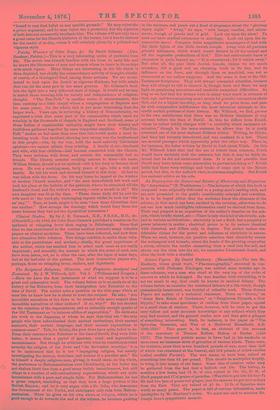Science Papers. By Daniel Hanbury. (Macmillan.)—Tho late Mr. Hanbury, whose
great work, " Pharmacographia," executed in con- junction with Professor Fliickiger, was noticed some months age in these columns, was a man who stood at the very top of the order of savants to which he belonged. He was familiar with everything, it is not too much to say, that could be known in medical botany. The volume before us contains the scattered labours of a life which, though prematurely terminated, was fruitful of valuable work. These Science Papers are mainly of a technical character. Notes on " Storax," on "Some Rare Kinds of Cardamom," on " Penghawar Djaureb, a New Styptic," to take some specimens at random from these pages, appeal to a small class of readers. These, however, will be sure to get the very fullest and most accurate knowledge of any subject which they may find treated, and the general reader now and then gets a glimpse of something interesting. Such, for instance, is the paper on "The Spiceries, Groceries, and Wax of a Mediaeval Household, A.D. 1303-1310." This paper is, in fact, an abstract of the account of the executors of Thomas Balton, Bishop of Exeter (obiii 1307). The deceased prelate seems to have had in his wardrobe or store-room an immense store of groceries of various kinds. There were, for instance, more than seven hundred pounds of wax, more than half of which was consumed at the funeral, and 311 pounds of tallow candles (called candelce Parisice). The wax seems to have been valued at something less than 8d. per pound. This should be multiplied largely, to bring it into money of oar times. Some idea of relative value may be gathered from the fact that a bullock cost 10s. The bishop, to mention a few items, had 74 lb. of rice, valued at 13s. 8d., 21 lb. of black pepper and 17 of grains of paradise. (Was this to put into his beer ?) He had two jars of preserved ginger, just the same as we get now-a-days from the East. They are valued at El 8s. 15 lb. of liquorice were worth as many pence. The paper is full of curious information, made intelligible by Mr. Hanbury's notes. We must not omit to mention Mr. Joseph Inco's sympathetic memoir.


































 Previous page
Previous page